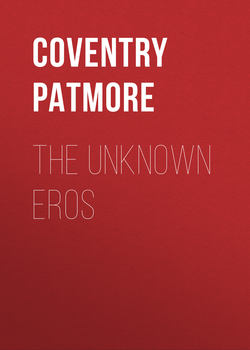Читать книгу The Unknown Eros - Coventry Patmore - Страница 1
PREFACE TO THIRD EDITION
ОглавлениеTo this edition of “The Unknown Eros” are added all the other poems I have written, in what I venture—because it has no other name—to call “catalectic verse.” Nearly all English metres owe their existence as metres to “catalexis,” or pause, for the time of one or more feet, and, as a rule, the position and amount of catalexis are fixed. But the verse in which this volume is written is catalectic par excellence, employing the pause (as it does the rhyme) with freedom only limited by the exigencies of poetic passion. From the time of Drummond of Hawthornden to our own, some of the noblest flights of English poetry have been taken on the wings of this verse; but with ordinary readers it has been more or less discredited by the far greater number of abortive efforts, on the part sometimes of considerable poets, to adapt it to purposes with which it has no expressional correspondence; or to vary it by rhythmical movements which are destructive of its character.
Some persons, unlearned in the subject of metre, have objected to this kind of verse that it is “lawless.” But it has its laws as truly as any other. In its highest order, the lyric or “ode,” it is a tetrameter, the line having the time of eight iambics. When it descends to narrative, or the expression of a less-exalted strain of thought, it becomes a trimeter, having the time of six iambics, or even a dimeter, with the time of four; and it is allowable to vary the tetrameter “ode” by the occasional introduction of passages in either or both of these inferior measures, but not, I think, by the use of any other. The license to rhyme at indefinite intervals is counterbalanced, in the writing of all poets who have employed this metre successfully, by unusual frequency in the recurrence of the same rhyme. For information on the generally overlooked but primarily important function of catalexis in English verse I refer such readers as may be curious about the subject to the Essay printed as an appendix to the later editions of my collected poems.
I do not pretend to have done more than very moderate justice to the exceeding grace and dignity and the inexhaustible expressiveness of which this kind of metre is capable; but I can say that I have never attempted to write in it in the absence of that one justification of and prime qualification for its use, namely, the impulse of some thought that “voluntary moved harmonious numbers.”
COVENTRY PATMORE.
HASTINGS, 1890.
